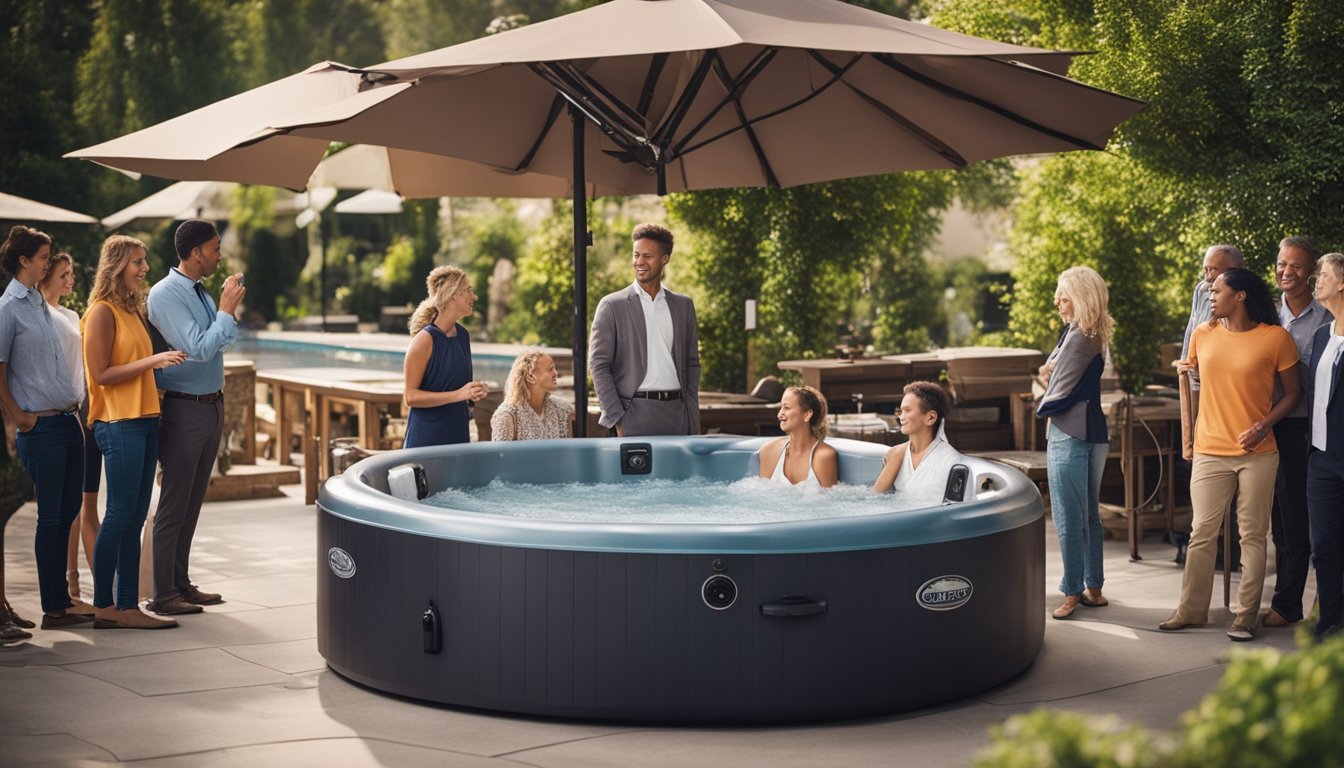Late updated: 19 Dec 2024 15:12
Written by: James Whitaker
The Economic Impact of Hot Tub Rentals: Boosting Local Markets
Exploring the world of hot tub rentals reveals an intriguing and profitable niche within the larger accommodation and leisure industry. With increasing demand for unique holiday experiences, many property owners are considering whether this bubbling addition could enhance their rental offerings. The integration of hot tubs into short-term rental properties generates not only relaxation for guests but also has a tangible economic benefit for owners. This surge in popularity offers promising returns, making it an investment worthy of consideration for both new and established property entrepreneurs.

Hot tub rentals tap into market trends that emphasise personal luxury and wellness, driving their popularity among holidaymakers seeking an upgraded experience. While the initial investment can be significant, the potential for increased bookings and premium pricing presents an attractive opportunity to maximise profitability. Our exploration into this topic will highlight the essentials for setting up a successful hot tub rental business and strategies to optimise efficiency in operations.
Key Takeaways
- Hot tub rentals boost property appeal and income.
- Understanding demand is crucial for successful investment.
- Effective operation enhances profitability and efficiency.
Establishing Your Hot Tub Rental Business

Building a hot tub rental business requires clear understanding of market dynamics, legal frameworks, initial investments, and strategic promotion. Additionally, careful selection and setup of hot tubs are crucial for operational success.
Analysing Market Demand and Trends
We begin by examining market demand and industry trends. Understanding local demand for hot tub rentals, particularly in areas popular for short-term stays like Airbnb and Vrbo, is crucial. Looking into existing businesses, seasonal trends, and customer preferences helps us identify gaps in the market.
Engaging in comprehensive industry research allows us to tailor services to meet current trends. We must also consider demographic factors, such as regions with higher incomes, and analyse how they impact demand. Collecting data from platforms like Google Trends may provide insights into when and where interest peaks.
Legal Considerations
Navigating the legal landscape is essential to operate smoothly. We need to determine which licenses and permits are required by our local government. Common requirements include business registration and zoning permits.
Insurance is another key factor. Hot tub rental insurance, which often includes general liability insurance, should be in place to protect against unforeseen incidents. This coverage ensures both our assets and our clients’ properties remain safeguarded. Consulting with legal professionals or insurance agents can help us understand our obligations and liabilities clearly.
Investments and Operational Costs
Starting a hot tub rental business involves a range of initial investments and ongoing operational costs. Initial expenses typically include purchasing hot tubs, delivery vehicles, and electrical setups. Investing in high-quality, energy-efficient models can minimise maintenance and heating costs.
Operational costs consist of regular maintenance, cleaning, and repairs. We should also account for utilities such as water and electricity. Pricing strategies need to be developed to cover these costs and generate profit. Leasing may be an option to minimise initial investments, but often comes with longer-term financial obligations.
Developing a Strategic Marketing Plan
A robust marketing plan is vital for attracting customers. We need to focus on both online and offline marketing strategies. Establishing a professional website and enhancing online presence through SEO can significantly increase visibility.
Social media marketing, targeting platforms like Instagram and Facebook, helps us reach a broader audience. Offering special promotions or collaborations with local businesses can also expand our customer base. Consistent, targeted marketing strategies ensure we connect effectively with potential clients.
Selection and Setup of Hot Tubs
Careful selection and setup of hot tubs is crucial to ensure customer satisfaction and operational efficiency. Choosing the right size, quality, and energy-efficient models impacts both the client experience and our running costs. Features like lighting and heating efficiency enhance user satisfaction.
Setup involves electrical installation and regular maintenance to ensure safety and functionality. Accessories such as steps, covers, and chemical kits should also be included to enhance usability. We must ensure that every aspect of the setup meets safety standards and enhances client experience. Evaluations and client feedback guide further improvements in our offerings.
Maximising Profitability and Efficiency

Hot tub rentals can offer tremendous economic potential by focusing on pricing strategies and efficient operations. Successful businesses in this sector focus on key operational enhancements and cost management while assessing potential returns.
Enhancing Guest Experience with Amenities
A well-planned hot tub installation can significantly boost guest satisfaction in both vacation and short-term rentals. Hydrotherapy features such as jets and adjustable temperatures can add value. Additionally, amenities like mood lighting or a pool can create an attractive environment.
Offering a clean, well-maintained tub directly impacts guest reviews and repeat bookings. Pricing strategies become more flexible with a well-outfitted tub. Weekend rates or packages can address demand spikes, maximising revenue potential.
Cost-Effective Maintenance and Operations
Maintaining hot tubs involves regular checks and treatment to ensure long-term functionality. Regular maintenance includes balancing both chemical and pH levels using agents like chlorine or bromine.
To ensure energy efficiency, we should track usage and adjust settings accordingly. Keeping filters clean enhances performance and decreases operational costs. Off-peak energy usage and seasonal maintenance can further reduce expenses. These actions not only minimise costs but also prevent costly repairs.
Assessing Return on Investment
An effective return on investment analysis for hot tub rentals considers initial hot tub sales and installation costs against potential income. Assess trends within the vacation rental market to align your offerings with guest preferences, which can influence profitability.
Investing in robust warranties and setting aside funds for potential repairs can mitigate financial risks. Understanding your target market's expectations helps in determining the appropriate price points, ultimately leading to successful financial returns. Through these strategic approaches, hot tub rentals can significantly contribute to an attractive and profitable short-term rental offering.
Frequently Asked Questions

Hot tub rentals can impact both operating costs and potential returns. Installation can add significant value to holiday properties, while various expenses arise during ownership. Understanding tax implications and budgeting considerations is key. Here, we explore these elements clearly.
What are the typical running costs associated with hot tub rentals?
Running costs for hot tubs include electricity, maintenance, and cleaning chemicals. Depending on usage and climate, electricity can vary significantly. Regular maintenance ensures a long lifespan and optimal performance. Cleaning chemicals are essential to maintain health standards and guest satisfaction.
How much can a hot tub installation increase the value of a holiday rental property?
Installing a hot tub can significantly enhance a property's appeal. It's estimated that listings with hot tubs often see increased booking rates and nightly prices. This added value makes properties more attractive to tourists seeking relaxation and unique amenities.
Can owners claim tax deductions for hot tubs on rental properties?
Owners may be eligible for tax deductions if a hot tub is deemed an improvement to a rental property. Deductions might apply to installation and maintenance costs. It’s advisable to consult a tax professional to navigate specific regulations and maximise benefits.
What contributes to the majority of expenses when owning a hot tub?
The majority of expenses in hot tub ownership are typically electricity, repairs, and regular maintenance. High usage can lead to increased energy consumption. Occasional repairs and consistent upkeep are necessary to ensure the hot tub remains in good working condition.
What should one budget for when considering the integration of a hot tub into a rental property?
When budgeting for a hot tub, consider purchase, installation, and ongoing maintenance costs. Initial investment can be substantial, but potential revenue increases justify these expenses. Allowing for repair and maintenance costs ensures the hot tub remains an asset rather than a liability.
What is the average profit margin for businesses renting out hot tubs?
The profit margin for hot tub rental businesses varies based on demand and operational efficiency. In high-demand areas, margins can be significant. Efficient management, competitive pricing strategies, and cost control play crucial roles in determining profitability and overall business success.
